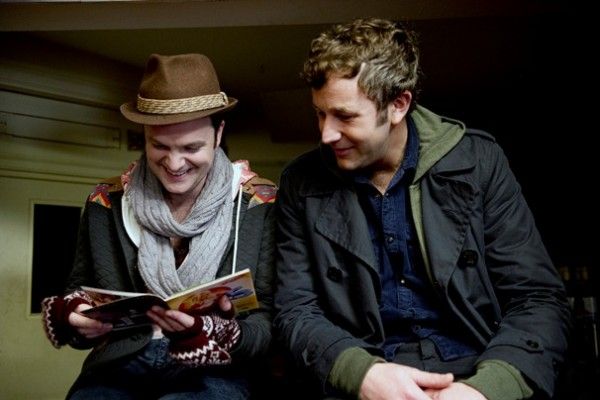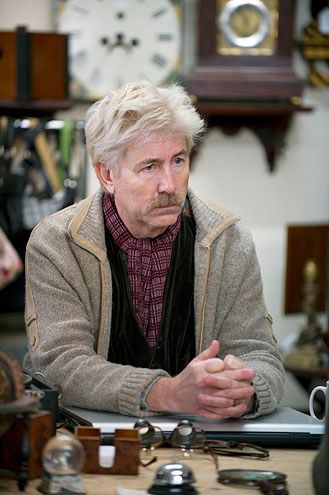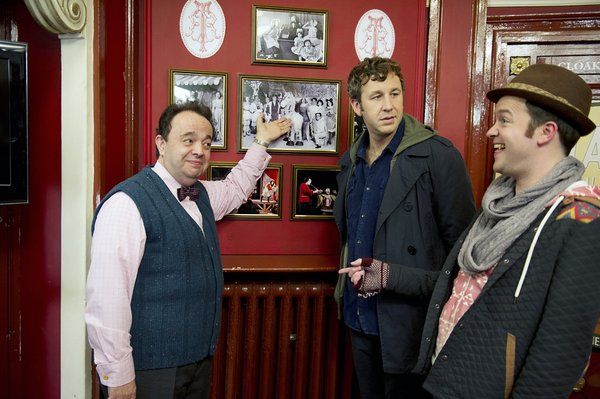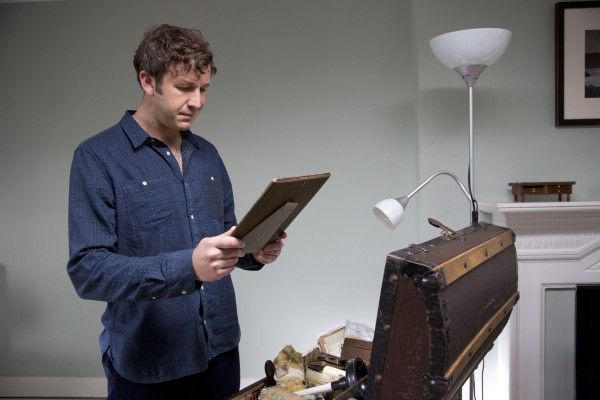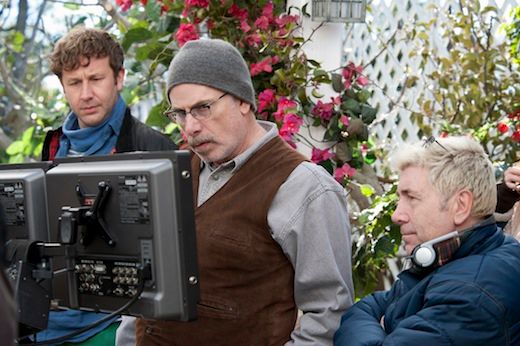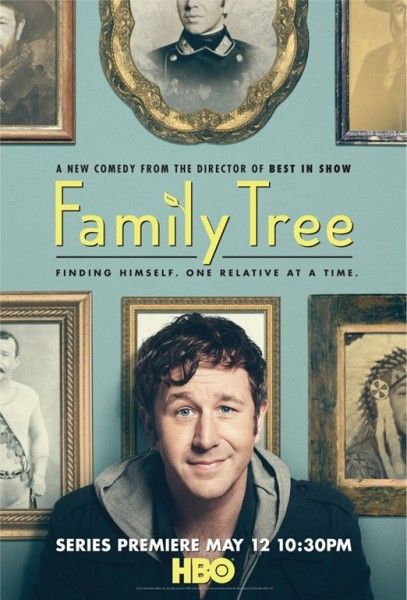Written and created by Christopher Guest and Jim Piddock, the eight-episode HBO comedy Family Tree is a documentary-style series that follows Tom Chadwick (Chris O’Dowd), a 30-year-old with an unsure sense of his own identity. When he decides to start investigating his lineage, he uncovers a world of odd stories and characters that take him from the UK to the U.S., and give him a better sense of who he is and where he comes from.
During this exclusive phone interview with Collider, executive producer/writer/actor Jim Piddock talked about the experience of collaborating with Christopher Guest, how this idea evolved into a TV show, sticking to a 30-minute timeframe, what he likes about this kind of comedy, writing hugely detailed backstories for the main cast, how much work an improvised project like this really is, and the advantage of having half of the series set in the UK and half set in the U.S. He also talked about never getting typecast, as an actor or a writer, how the rumor started that he would be writing the 50 Shades of Grey screenplay, and how he ended up working on both sides of the camera. Check out what he had to say after the jump.
Collider: When Christopher Guest came to you with this idea, was it something you were immediately intrigued by, or did it take some convincing to get you to collaborate with him, behind the camera?
JIM PIDDOCK: He asked me to come to lunch and he said, “I’ve been looking a bit into my own family tree. It’s an area that interests me. What do you think?” I’d worked with him as an actor, but never as a writer. But, he knew that I had written for both television and film. He said, “What do you think of this?,” and I said, “I like the whole idea because it’s so accessible. Everybody has a family tree.” That show that was on, Who Do You Think You Are?, was very popular and very relatable. So, I went away, and then we had another lunch. By then, we both knew that it was absolutely not a film because a family tree has no finite quality to it. By its nature, it’s sprawling and you can go down different branches, avenues or storylines. There was no beginning, middle and end, and why should there be? So, we always figured it would be a series. And then, it was just a question of how, where, why and what we wanted to do with that. The thing that was most appealing was that each week we could go into a different world with the same characters, mostly, and meet new characters. That felt exciting to us because we wouldn’t get locked into a situation comedy where you are literally just in one place with the same set of people, every single week. That appealed to us.
Since this is an idea that is more open-ended, did you approach this with any end goal in mind, or are you just seeing where it takes you?
PIDDOCK: Initially, we worked for several months, across each other’s dining room tables, making each other laugh and scribbling down things on yellow pads, and then on notecards, and pieced together what it was about. It started with the characters, clearly. Most of Chris’ work starts with characters, and most of my work does, as well. So, we started there, and then we see where we want to go. We decided which ideas and scenes warranted a whole episode, and expanded it from there. In the end, we actually had enough material to start thinking about what a second series would be, certainly in terms of an overall arc and areas we wanted to go into, places we would want to go, and people we would want to meet. It started to spiral out of control, as we came up with more and more material.
Did it ever feel like half an hour was limiting, or did that feel like a good amount of time, opposed to an hour show?
PIDDOCK: That’s actually really interesting. At first, we were worried about that. Most of my writing work has been in film. I have done some TV, but most of it has been in film. And Chris has mostly worked in film. So, it was like, “Do we try to have a traditional first, second and third act, and just reduce it down, or do we just do a slice of whatever it is?” We decided that we weren’t going to pigeonhole ourselves. As it happened, this first season is very tightly structured, in terms of each episode having a story. We wanted to hang everything onto a story. We felt that it was important to have that solidity and that safety net of a strong story. But, we also talked about the episode where he is driving through Amish country to find some cousin or some distant ancestor and the car breaks down. It’s the getting stuck in an elevator episode, with people in one single situation. I think we may experiment with that, if we go further with this. I know we’re going to try a few different things, and never get too predictable.
How has the experience been, working on both sides of the camera with Christopher Guest?
PIDDOCK: To be honest with you – and I know it’s boring ‘cause everyone wants dirt – it’s been delightful. I always have fun doing his films, as an actor. It’s very relaxed, on set. We didn’t know how it would work, writing wise, and we both said, “Let’s see how it goes.” Luckily, we have extremely similar sensibilities and we have an extremely similar work ethic. Where we’re different, it actually compliments each other. I tend to be in a rush, and Chris tends to take things slowly, so it was good. We were a perfect balance. And most importantly, we made each other laugh for six or seven hours, every day. It was fun to do, even if the first couple of months, we literally had no idea whether we were going to have anything at the end of it.
Because this was your first time working with him behind the camera, did you feel more stressed or nervous about your own performance, as well as having a hand in guiding the other performances?
PIDDOCK: I did. That’s another good question. I actually took two days off from my producing duties in London, before I was to shoot my stuff, because I was getting extremely anxious. It is a very different hat that you’re wearing and a very different part of your brain. Because Chris was mostly involved with a lot of the directorial stuff, I was involved with some of that and some of the producing stuff and some of the casting stuff. So, I needed to actually just stop and go, “Okay, I have to actually be an actor for hire again,” and get my head around that. I scribbled things down and typed things in my iPhone for a few weeks, as I always do, but I needed two days to look at what I had and who I was going to be, other than the silly hair and mustache. I had to flush it out a bit. And the last film we’d done was six or seven years ago, so I really had to be on my game and get back into training.
Does this type of comedy come easily for you, or is it something you feel like you’ve had to work at?
PIDDOCK: When I first did Best in Show, I had never done any improvisation. Chris has such a knack for knowing, when he meets people. He doesn’t really audition. He just meets people. We do see tapes, so we see people improvise on tape, but he just gets a gut feeling. God bless him. When I met him for Best in Show, Eugene [Levy] had suggested me because he knew my work. So, I met with them and they’re both socially reserved, and I was just babbling. After about 10 minutes, I said, “Here’s a tape of what I do. If you like it, great.” And Chris called me when I was driving home and said, “We’d love you to be in it.” He has a knack for knowing that. Best in Show was a very wonderful, happy accident. I’ve done a lot more improvising since then, and it’s great because it’s so freeing. It’s absolutely terrifying, but it’s really freeing.
People have really different methods of working. Some people prepare tons and tons of material, literally on paper, and they will use as much of it as they can. Some people prepare various lines in their heads and various avenues to go. And some people show up literally going, “I know who I am and I know what the situation is, but I’m just going to see what comes out.” You get the full spectrum of the way people work, which is fascinating, but the one common denominator is that they’re all really good actors, and they’re really truthful actors. This stuff doesn’t work unless it’s real and believable. My mantra, from day one of Best in Show, was, “I don’t care if I’m funny. I just want people to believe I’m that guy.” For all of us, that’s very important. You can over think it. On my first day of doing Mr. Pfister, I thought of too many things to bring to the table. My writing brain was still in overdrive, and I was cramming stuff in. And then, the next day I went, “You know what? Forget it. I’m just going to see what comes up on the day.” It was a different experience, but they’re both equally valid, in their own way. It was more fun to just let go of the safety net.
Did you make really detailed character backstories for the actors, or did you leave that up to them?
PIDDOCK: Yes, that’s part of the process. We wrote hugely detailed backstories, down to where people went to school, the name of the school, what their pets were, what their pets were called, and we gave them to all the main actors. And then, Chris meets with them and talks to them about the character, so they can bring what they want to the table. From there on, in terms of what they’re about and who they are, they have that to work with. But, how they look, what they wear and how they speak is all up to them. That’s great, for an actor. It’s so wonderful and creative to go in and tell the wardrobe department what you want to wear and how you want your hair to look. The actors get to do more than they would, normally.
Because you’re all so good at what you do, people think you must show up on set and you’re just funny all day, and then you go home. What do you think would most surprise people, in regard to how much work an improvised project like this really is?
PIDDOCK: People would know, if they tried it. They’d get it, right away. It’s incredibly detailed. It’s hugely detail-oriented. In the background, you’ll see things going on. There are props and set dressing that’s a joke. That’s why Chris’ films endure. You can watch them 20 times and see new things, each time. The level of detail and the layers are really thick. I’ve written film and TV series, and this was the longest writing process, by far. I think we spent a total of eight to 10 months writing these eight episodes. I can usually write a screenplay in two to four weeks. It was a hugely rigorous thing. We do very, very detailed outlines. We didn’t write dialogue, other than for the TV shows within the show. We wrote the fake shows that the characters watch. Those were scripted. We wrote those in a couple of hours. But, the rest of it took a long time.
Do you find that one of the interesting things about comedy is that, if you’re doing it right, people think it’s so easy?
PIDDOCK: Yeah, absolutely! Luckily, we got great actors who bring so much to the table. They feel secure in who they are and why they’re in a scene, which leaves them free to just play, and they’re all really great at that. It was great to see people who had never done improvisation before be terrified, and then spread their wings and really fly.
Did Chris O’Dowd take to this style of working pretty easily?
PIDDOCK: Remarkably, yes. Chris O’Dowd is a very special talent. He’s one of those very, very rare actors who can be the clown or he can be the straight man playing off the clown, in a scene. He’s also a romantic lead. That’s extremely hard to find. He’s just innately charming.
When you have a series like this with so many eccentric characters, did you have to make sure your central character was the most normal and likeable, so that audiences would want to follow him on this journey?
PIDDOCK: Yes, absolutely! It’s wonderful seeing all these amazing eccentric characters. I knew some of them were eccentric, but I hadn’t really thought about it. I just thought of them as interesting and different. In all of our lives, we know some boring people, but we don’t want to see them on television. In our families, we have some very odd people who have odd neurosis. All of us are really strange people.
Did you find it advantageous to have the different locations for this?
PIDDOCK: Yeah, it was really liberating, as opposed to being stuck in a warehouse where everyone works, or whatever it is. It was great because it meant that we could make a mini-film each week and go into different worlds. We could use an ancestor or a relative living overseas, as an excuse to open a door into a new world. That’s where Chris’ stuff works so well. You enter the world of dog shows, you enter the world of folk music, you enter the world of community theater, or whatever it is. We knew that we had the license to do that each week, or not, if we didn’t want to.
You’ve had such an interesting career, working in film, TV, theater and voice-over work, in both comedy and drama. Do you enjoy having that mix? Is that something you strive for?
PIDDOCK: I actually love that. I’m an old school actor, in the sense. More and more now, I play myself, as I get older. Even as a writer, I never got typecast. I’ve always bounced from project to project, or initiated my own things. I was never known as the guy who wrote romantic comedies or sci-fi, or whatever, but that’s fun to me. The first two films I ever had made, as a writer, were both thrillers, which was great. There was nothing funny about either of them, or not intentionally.
So, were you ever seriously connected to the script for 50 Shades of Grey, or was that just a bizarre rumor?
PIDDOCK: That was a Facebook joke, I have to confess. I literally was up late at night and a stupid idea came into my head, so I went on Facebook because I knew about three of my friends might find it amusing. I said, “I went in to pitch for the 50 Shades of Grey screenplay today. I only came up with 49, but I think I might have still gotten the gig.” It was not even a very good joke, but a few people found it amusing. A few more people thought I was serious, and a website picked up on it and published a thing about it. And then, it was literally on 200 websites. I was working with Chris that day and my phone was going berserk. I had to eventually put out a statement saying that it was a joke. I then realized the power of social media, and that it wasn’t even such a good joke. I’d written a Cold War romantic drama with Sharon Stone and Rupert Everett (called A Different Loyalty), so I’ve written in that field. But, the response was lovely. I read a comment on a website that said, “Oh, what a perfect choice. With his range of experience, there couldn’t be a better writer for 50 Shades of Grey.” And then, Bret Easton Ellis was really pissed off because he wanted to write it.
Was there something that led you to get involved with both sides of the camera? Was that something you’d always wanted to do?
PIDDOCK: I did always want to write. And then, when I left New York, where I was working very steadily in the theater – I had done three Broadway shows in a row and was a bit burnt out – I moved out to L.A. and I was not working very much. I came in cold and I’d work for a week, but then I’d have a month or two off. I thought, “I’m going to go crazy unless I actually do write.” Like a lot of things in life, it was a situation that came about by circumstances.
Do you enjoy writing for television, where you get the opportunity to explore characters for a bit longer than you do with a film?
PIDDOCK: Yeah, absolutely. People say that you want to be varied in your career, and I’ve done so many things and am very appreciative. But, the one thing I’ve never done and wanted to do was to be a regular on a TV show, where you get 22 weeks of the year to develop and play a character. I’ve done arcs of five or eight episodes on shows, but I’d like to have a character that’s rich enough and deep enough to want to explore and live with for a few years. Playing the same character, but doing different scenes seems very exciting to me.
Family Tree airs on Sunday nights on HBO.

